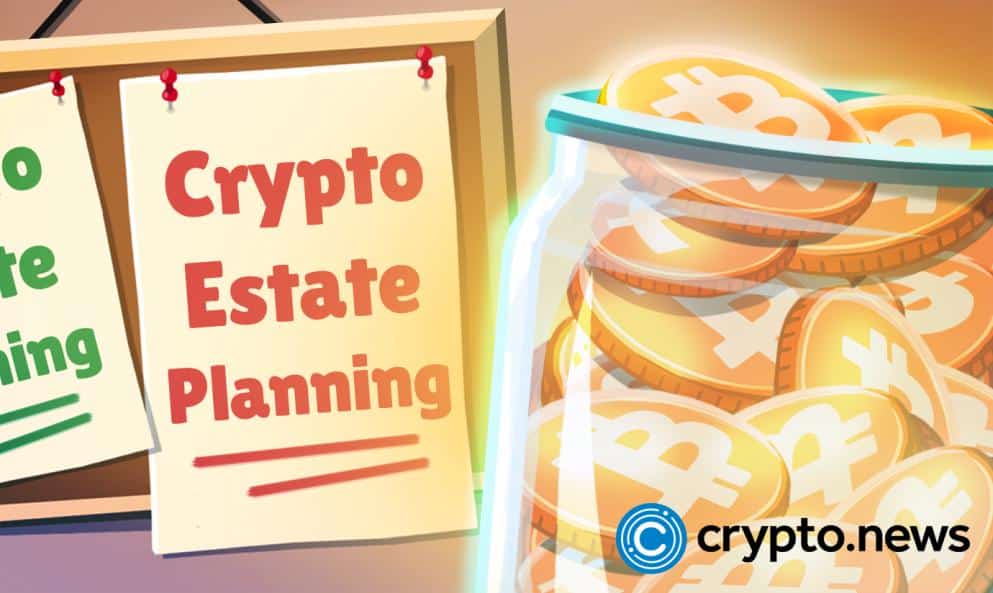Crypto Estate Planning: What Happens to Your Cryptocurrency When You Die

The self-sovereign nature of cryptocurrencies means that only the wallet owner can access the crypto assets they hold. As a result, in the case of expected death, crypto holdings are often lost forever, leaving dependents unable to access what may be a substantial inheritance. To prevent this, investors should consider crypto estate planning to ensure their dependents can access their crypto in case they should pass on prematurely. Read on to find out what crypto estate planning is and how it works.
What Happens to Your Crypto When You Die (If You Don’t Make Any Arrangements)?
Crypto assets are stored in a wallet that requires a private key — generally, a 12-word phrase called the seed phrase — for access purposes. As the name suggests, a private key is confidential, and you cannot access your crypto assets without it.
In the unfortunate circumstance that you pass on without making arrangements for your loved ones to inherit the digital assets in your private wallet (e.g., hardware wallet), they will be lost forever.
As a result, your family would miss the chance to access your digital assets to fill the financial hole your absence has created.
However, if your crypto assets are stored in a crypto exchange account, for example, your beneficiaries may be able to access them, provided they present the appropriate documentation. This is possible because exchange accounts are custodial, meaning crypto exchanges hold their users’ private keys.
To avoid losing your digital asset holdings posthumous or putting your beneficiaries through a complicated and lengthy recovery process, you should consider crypto estate planning.
What Is Crypto Estate Planning?
Crypto estate planning is the process through which an individual arranges the transfer and management of their digital assets after death.
Since cryptocurrencies are relatively new, investors may overlook the need to plan for the transfer of this asset class in advance. However, awareness regarding the significance of crypto estate planning is increasing as the value of investors’ crypto holdings rises in tandem with crypto prices. As of September 6, 2022, over 2,000 addresses held at least 1,000BTC. Furthermore, 570,203 addresses hold between 1-10 BTC.
Estate planning for crypto assets entails getting help from a lawyer and possibly a tax advisor. This will minimize any crypto tax liabilities subject to inheritances and ensure the law will safeguard the rights of your beneficiaries.
Nevertheless, you could carry out the planning yourself without the help of professionals. Whichever route you take in crypto estate planning, your priority should be keeping your assets safe and ascertaining that your loved ones will get easy access.
How to Ensure Your Dependants Can Access Their Digital Asset Inheritance
Let’s take a look at how you can pass on your digital wealth in the case of your death.
Document All the Necessary Information
One way to ensure your dependants can access their digital asset inheritance is by simply writing down all the essential information about your crypto holdings. If you don’t write it down, they’ll never know these assets even exist in the first place unless you tell them in advance.
Begin with the where. Disclose the location of your crypto assets and state the amount (this is optional). If they are on an exchange, you could write: “I have 5 bitcoin and 200 litecoin on Bitfinex.” Your statement should go as follows if your assets are in a private non-custodial wallet: “I have 10 ETH and 15 BNB on Exodus and Ledger. The backups are stored in my bedroom safe.”
Next, you might want to explain that Ledger is a hardware wallet that looks like a USB drive and that the backup contains the private keys for both wallets. Provide a thorough guide explaining how they can access these assets.
You may also leave guidelines on how you want them to manage the crypto assets. For instance, you could instruct them to only sell a specified portion and HODL the rest. Put your document in an envelope and safely store it in a place where your family can easily find it after your passing.
Record access controls to your wallets separately. Assuming you have a paper wallet containing the 12-word wallet recovery seed phrase, you can add to it other access controls like PINs and passwords for both exchange and private wallets. Put this paper in an envelope and store it in a bedroom safe or a security deposit box accessible by a loved one.
Since access controls are very important, ensure you open a deposit box with a highly secure service provider.
Get Assitance From a Third Party
Using a third party like a lawyer is another approach in crypto estate planning. This means your crypto assets will be added to your will with instructions on who gets what. Your lawyer will also need a document like the one described above. However, keep in mind that they will have access to your seed phrase, and your will may have tax implications.
To mitigate the former, you can store your crypto assets in a multi-signature setup. This way, a lawyer cannot unilaterally run off with your crypto assets. It is very important to think about these factors and potentially put such a setup in place before approaching a lawyer.
Finally, investors could also use crypto inheritance firms such as Safe Haven, and Casa Covenant. You should, however, research such firms thoroughly before using them. That way, you can ensure that the service they provide is suitable for your situation and that you feel comfortable trusting them with information about your digital assets.
FAQs
When should I start bitcoin estate planning?
As soon as you can.
Traditionally, beneficiaries can walk into a bank and present the personal information of their loved ones to access their bank accounts. However, digital assets in a private wallet are not connected to personal information like names, identification numbers, and phone numbers. There is also no place for beneficiaries to walk in and ask for funds. That means investors are solely responsible for ensuring their assets are posthumously accessible by documenting all the crucial details.
So, rather than risk losing your investment after death, you may be better off making inheritance arrangements sooner rather than later.
How often should I update my crypto estate plan?
You should update your crypto estate plan as often as possible. Regular investors may update their crypto estate plans monthly. However, you can update it yearly if you are not as active.
Should I teach my dependents about crypto?
Probably, yes.
Rather than leave a long list of guidelines for your dependents to follow, you may consider teaching them about cryptocurrencies in advance. Passing your knowledge on to them will allow you to rest assured your investment is in educated hands.
Should I leave instructions on how my crypto assets should be managed?
It depends on your personal preference.
Nevertheless, beneficiaries are naturally inclined to sell, according to Charles Kolstad, a partner at a crypto-focused law firm. So, leave clear instructions if you don’t want them to sell.
What estate planning tools are there for large crypto holders?
Large crypto holders with assets worth over $100 million could create a private trust company, also known as a family trust company. This is an estate planning tool that high net worth families use to preserve their wealth. Both family and non-family members may form the board.
Through the family trust, you can name the beneficiaries of your crypto assets and how they will be distributed. Also, you should name the person (trustee) responsible for executing trust instructions. The trustee should have crypto asset knowledge, be able to manage these assets, and react quickly to market changes that may affect the crypto investment.
A private trust company may come with tax advantages, but it could carry high initial costs. Therefore, consult a financial advisor to find out if it’s necessary to create a family trust company to manage your crypto wealth.










